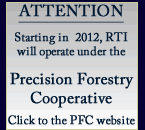 |
 |
 |
 |


Washington Forest Futures:
Competitive Position Study
| Washington Forest Futures: Competitive Position Study PDF Strong growth in the U.S. housing sector has provided consistent demand for forest products manufactured in Washington over the past 15 years. However, over the same period, weak export markets and a changing competitive environment have moderated international demand for the state’s forest products and have had an adverse impact on the international competitiveness of Washington’s forest products industry. This trend was exacerbated by the 1997 Asian financial crisis, with a consequence that domestic markets are more important to Washington producers than ever before. In addition, timber harvest restrictions and regulatory constraints over the past 15 years increased costs of producing timber and caused the closure of many production facilities in Washington. High value log exports and plywood production were most affected. The number and the production value of value-added manufacturers have increased, and the demand for commercial timber has shifted to one that is primarily lumber-oriented. Commercial forest land profitability has changed as restrictions and the composition of the forest sector have shifted. In light of these factors, we will examine the competitive position of Washington’s commercial forest lands and ownerships.
|


